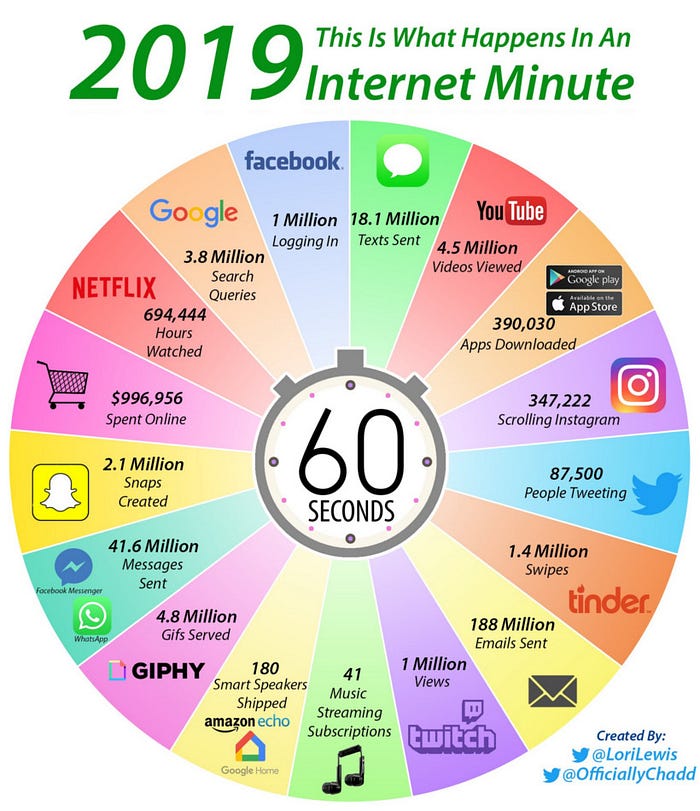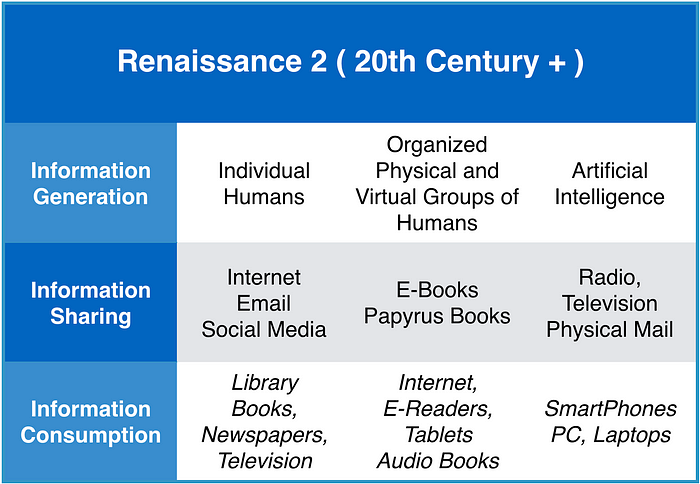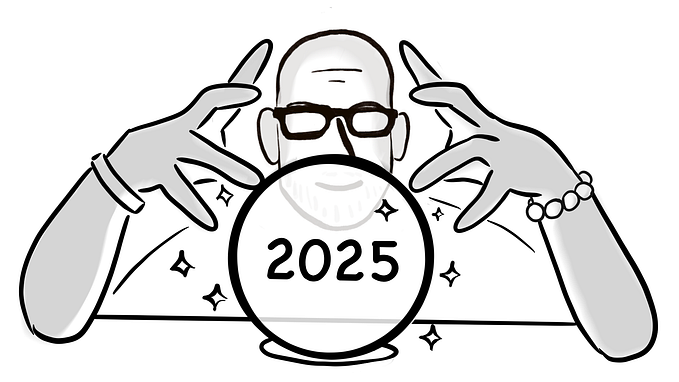
Ecosystems Of Exponential Human Progress
Proposed Law
Law of Exponential Human Progress : Disproportionate growth in human history has been a result of innovation around our ability to generate, share and consume information. The growth is ecosystem driven.
Information Hungry Primates
Advancement of the human species throughout history has been linked with our ability to generate, share and consume information. The innate curiosity and the insatiable hunger for information is what differentiates us from our evolutionary ancestors and other inhabitants of our planet.
Our inherent curiosity also puts the species part in our binomial name — Homo Sapiens

“Study the past if you would define the future” — Confucius
If we observe our history, there have been defined periods where intellect and human endeavor has flourished disproportionately and has led to the exponential progress of our species in a very short amount of time. Looking carefully, these intellectual-supernova periods have been possible due to some innovation around information sharing and have historically been ecosystem driven.

Alexandria — 200 BC
The ancient city of Alexandria, was one of the earliest ecosystems of exponential human progress. It had one of the largest and most significant libraries of the ancient world : The Library Of Alexandria.
Disruption : Library
This was unprecedented as it was the first time so much of information was aggregated at one place for consumption. A place where one could go, to gather knowledge on a variety of subjects. It was a time when books and scrolls were handwritten on papyrus, they were housed in grand buildings and were considered equivalent to treasure. When merchant ships stopped at Alexandria, they were searched not for drugs or weapons, but for books and scrolls, which were borrowed and copied to be housed at the library.

The library was but one part of the Musaeum of Alexandria, which functioned as a research institute. In addition to the library, the Musaeum included rooms for the study of astronomy, anatomy, and even a zoo of exotic animals.
Curious hackers of the ancient world studied, wrote and experimented on mathematics, astronomy, physics, geometry, engineering, geography, physiology, and medicine.
Renowned minds, made great contributions and led to exponential advancement in our understanding of the world. Few familiar and notable individuals amongst them —
Euclid : Geometry, Archimedes : Archimedes’ principle, Eratosthenes : Geography, Herophilus : Anatomy, Hipparchus : Trigonometry
It doesn’t do justice to tag them with just one of their discovery as all of them were legendary polymaths, very surprising to see how much they figured out about our world, given the primitive tools and knowledge at the time. They established many basic fundamental facts like the earth being round and not being at the center of the universe — which was against the widely-held belief for centuries to come, till the next great revolution : Renaissance

Florence — 1500 AD
The period from 5th to 15th century AD is also known as the Dark Ages, a characterization highlighting the relative scarcity of literary, cultural and scientific output from this time.
After the collapse of Rome, teaching and learning moved to monastic and cathedral schools, with the study of biblical texts at the center of education. Out of the last 2000 years, majority of us spent 1000 years locked in dark ages, reading and practicing religion — full time.
Books were the main medium to create, share and consume information during the period.
Early 15th Century, the University of Cambridge had one of the largest libraries in Europe — constituting of just 122 books.
Books were rare since they needed to laboriously handwritten by scribes.

Disruption : Movable Type
Around 1450, Gutenberg a goldsmith, invented the Movable Type, a printing press technology which totally disrupted printing industry of 15th Century.
The impact was so profound that the number of books went from 10,000 in total in Europe before the introduction of Movable Type to over 10 million books 50 years later.
News of scientific and geographic discoveries now quickly circulated. Medical texts were published with detailed anatomical illustrations. Mass communication became possible on a scale that was unparalleled.
The printing press helped to end the hold of the Catholic Church over much of northern Europe. The press as a tool of political and cultural change ensured the world would never be the same again.
Gutenberg, the man is a mystery, but his invention helped to enlighten the world in a way that was impossible with manuscripts. This, combined with patronage of families like Medici led to an unprecedented explosion of arts and science.
Renowned minds of this period made great contributions and led to exponential advancement in our understanding of the world —
Leonardo Da Vinci, Michelangelo, Raphael, Donatello, Nicholaus Copernicus , Francis Bacon, Galileo Galilei , Johannes Kepler, Martin Luther, William Shakespeare, Robert Boyle, William Byrd, Christopher Columbus, Tycho Brahe, Vasco da Gama, Jacques Cartier

Silicon Valley— 1980 AD
We are living in extraordinary times right now. There has been an unprecedented explosion in information generation, sharing and consumption which has redefined our society fundamentally in the timeline of a few decades — within one human generation !
Disruption : Semiconductors, PC, Internet, Smartphones and counting…
There have been a host of technology innovations focussed on information, which have led to the Information Technology revolution — which has changed every industry and the way we live our life.
Interesting observation here is that most of the innovation and companies leading the change are coming out of this ecosystem — spread over an area of 180 Square Miles along the coast in California — called Silicon Valley.
The current revolution — which I call Renaissance 2, has been unimaginably insane. The largest library in the world is the Library of US Congress. It is estimated to contain data of about 10 TeraBytes.
Today we are generating, sharing and consuming more data than the Library of US Congress every milli-second on the internet

Smartphones have virtually become an extension of our body and brain. It is just an external organ which we carry around with us in our pockets 99% of the times — Just like Kangaroos carry around Joeys.
The period of creation and innovation is still not over and we are staring at a hockey stick graph and unimaginable technology which will be like magic.
Any sufficiently advanced technology is indistinguishable from magic — Arthur C Clarke
Many notable people have contributed to the information revolution
Steve Jobs, Bill Gates, Mark Zuckerberg, Tim Berners-Lee, Gordon Moore, Sherman Fairchild, Steve Wozniak, Dennis Ritchie, Elon Musk, William Shockley, Larry Page, James Gosling, Alan Turing, Larry Ellison, Jeff Bezos, Michael Dell
The fire is still burning strong and the future looks exciting. We are all very lucky to be alive in a time like this !
















